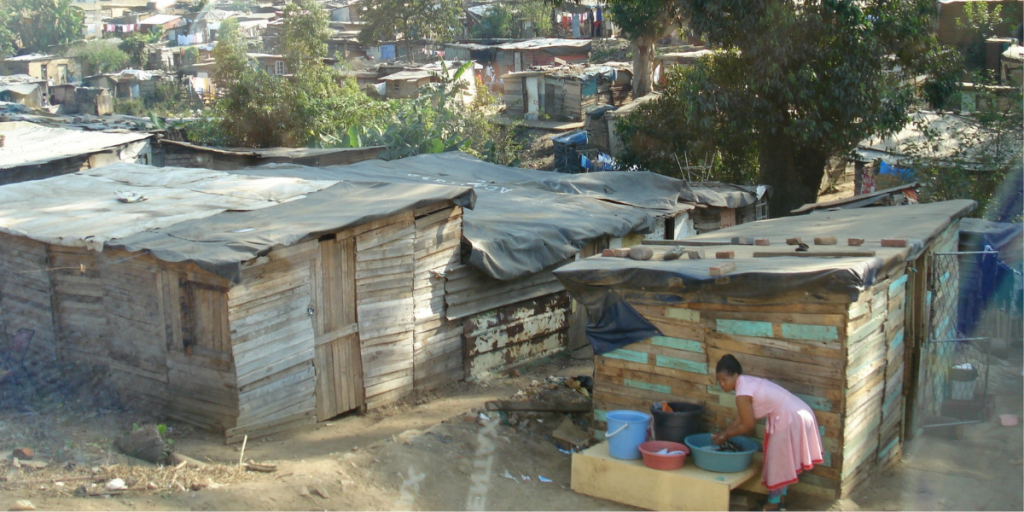Connecting the unconnected

Informal toilets and a safe circular water economy
International Symposium, Lancaster University, 28-29 March 2022
A venue for the exchange of ideas and knowledge between researchers, practitioners and policy makers concerned with ‘sanitation for water and health’ – for the benefit of informal urban dwellers.
Background
For most informal dwellers, water is unaffordable, intermittent, and unsafe. Even when relatively safe municipal water is accessible, water may be contaminated by faecal bacteria as it enters the shared, often over-used dispensing facilities and the ‘human infrastructure’ that carries it to people’s homes. We already know of many adverse consequences for the dwellers. Researchers now also warn of future global pandemics.
Ambitious targets, such as the Sustainable Development Goal (SDG) Target 6.2, aim to address this everyday challenge faced by over one billion informal dwellers globally. New approaches and tools are emerging. Yet, achieving safer sanitation at scale remains a challenge. That shared toilets are defined as problematic, and hence often excluded from official policy, remains a key barrier. The solution requires more than supply-driven, hardware-focussed interventions. Community-driven, demand-led approaches have an important role to play, not least to better align sanitation with the everyday realities of the direct users – the informal dwellers. This may be aided by:
- visualisation of ‘invisible’ contamination together with its health and social consequences
- assisted management of the existing stock of toilets
- communities ‘seeing’ the economic and environmental value of safely treating faecal matter e.g. the potential for capturing greenhouse gases, producing bio-energy and creating soil-conditioner as valuable end-products.
In short, to ‘leave no one behind’ as we work towards SDG Target 6.2, we need to connect informal toilets to a safe circular water economy: a concerted and sustainable set of actions to capture faecal matter from, and prevent faecal contamination within, informal communities. The activities range from maintaining the technical integrity of the sanitation facilities, periodically collecting and safely treating the faecal matter, to a complementary suite of empowerment and capacity building initiatives. Success rests on co-producing solutions, working for and with people and across disciplines and scales. Innovative education pathways are needed to ensure that invisible faecal contamination is (metaphorically) ‘made visible’ to ordinary people, those tasked with water provision, and those with a mandate to set global agendas. This ‘visibility’ could:
- be scientific, perhaps involving community youth and classroom experiments so that the next generation can then help educate parents, triggering social change
- involve education through appropriate art or cultural practices
- be turned into policy agenda for politicians, the media and civil society.
What is needed is a sanitation strategy built on rigorous interdisciplinary analysis that – like the provision of clean drinking water – is a cause for celebration and pride. Exploring this proposition has been a key objective of the GCRF-funded RECIRCULATE and ACTUATE projects, and our earlier work on the Last 100 Metres. The initial findings of these projects are very encouraging and deserve to be discussed and shared with research and practitioner communities.
Call for Abstracts
We invite researchers who are exploring any aspect of “Connecting the unconnected: informal toilets and a safe circular water economy” to submit papers discussing their methodologies, findings and learning. We identify the following guiding questions for papers:
- How extensive is faecal contamination of drinking water in informal settlements?
- What assumptions and practices contribute to the persistence of contamination?
- What value does society attribute to faecal waste, and can it be increased?
- Does supporting rather than shunning informal toilets make sense? How might it work?
- Is making ‘invisible’ faecal contamination ‘visible’ to stakeholders possible and useful?
- What are the pathways, actionable through policies, to ‘connecting the unconnected’?
- What are the key barriers to making informal sanitation a political priority?
Delegation number and arrangements
Depending on COVID-19 measures at the time of symposium, we plan to hold the event using a blended approach. Those who are able/willing to attend the event in person (capped to 50 delegates) will be invited to do so. We will select up to 24 papers on countries across Asia, Africa and Latin America, alongside keynote speakers and discussants.
Registration
To register to attend in-person, click here.
Key Dates
| Friday 25th February | Deadline for submission of abstracts (~500 words) to recirculate@lancaster.ac.uk |
| Friday 4th March | Notification of acceptance after peer review of abstracts |
| Friday 18th March | Registration closes (on a first come, first served basis) |
| Monday 28th & Tuesday 29th March | Symposium |
Sponsor: This symposium is part of RECIRCULATE – Driving eco-innovation in Africa: Capacity-building for a safe circular water economy, a project funded by UK Research & Innovation though the Global Challenges Research Fund Grant Ref.: ES/P010857/1.
Convenors: Dr Manoj Roy, Professor Roger Pickup, Ms Ella Foggitt and Ms Nikita Mehta.
